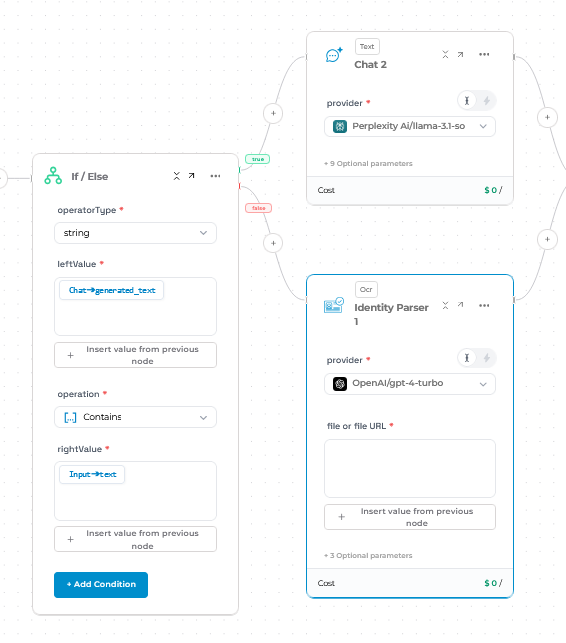Logic
Logic nodes are essential components for creating dynamic and flexible workflows. They enable you to control the execution flow based on conditions or iterative operations. Currently, Eden AI supports the IF Node, and a Loop Node is under development and will be available soon.
IF Node
The IF Node allows you to introduce conditional logic into your workflow. It evaluates a specified condition and routes the workflow based on whether the condition is met (true) or not (false). This is particularly useful for decision-making and branching workflows based on data or results.
Required Parameters:
- Condition: Define the logic to evaluate, such as:
- Comparison of values (e.g.,
input.value > 10) - Matching text (e.g.,
response.text contains 'error') - Boolean checks (e.g.,
response.success == true).
- Comparison of values (e.g.,
- True Path: Specify the node(s) to execute if the condition is met.
- False Path: Specify the node(s) to execute if the condition is not met.
Use Case Examples:
- Data-dependant process: Based the data, the process can be different and use different AI nodes.
- Dynamic Model Selection: Use one AI model if a confidence score is high and another if it is low.
- Data Validation: Skip processing nodes for invalid input.
Configuration Tips:
- Combine IF Nodes with AI feature nodes to customize outputs based on intermediate results.

Loop Node (Coming Soon)
The Loop Node will introduce iterative capabilities to your workflows, enabling repeated execution of one or more nodes for a set number of iterations or until a condition is met. This feature is ideal for processing lists, retrying operations, or performing batch tasks
Planned Capabilities:
- Loop over Data: Iterate through an array or list and process each item individually.
- Condition-Based Looping: Continue looping until a specific condition is met (e.g.,
response.status == 'success'). - Dynamic Outputs: Collect and aggregate results from each iteration into a single output.
Planned Use Case Examples:
- Agentic Workflows: Enable workflows to act dynamically based on intermediate outputs, simulating agent-like behavior. This includes:
- Iterative Decision-Making: Use the output of one iteration to modify inputs or parameters for the next (e.g., refining a search query or adjusting model prompts).
- Goal-Oriented Processing: Automatically adapt workflows to pursue a specific objective (e.g., iteratively improve a text summary until it meets quality metrics).
- Task Automation: Dynamically chain tasks based on intermediate results, creating autonomous workflows that complete multi-step objectives.
- Retry Logic: Retry tasks with a fallback mechanism in case of temporary errors.
- Data Aggregation: Process and combine results from multiple iterations into a unified format.
Future Updates
Eden AI continues to evolve, with the Loop Node and additional logic features planned for upcoming releases. These updates will further empower developers to build intelligent, robust, and adaptive workflows.
Updated 4 months ago
